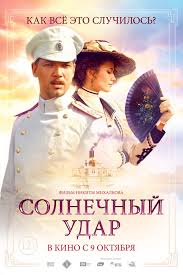Sunstroke (2014 film)
| Sunstroke | |
|---|---|
 Russian film poster | |
| Directed by | Nikita Mikhalkov |
| Screenplay by | Vladimir Moiseyenko Nikita Mikhalkov Aleksandr Adabashyan |
| Produced by | Leonid Vereshchagin |
| Starring | Mārtiņš Kalita Victoria Solovyova Miloš Biković |
| Cinematography | Vladislav Opelyants |
| Edited by | Svetolik Zajc |
| Music by | Eduard Artemyev |
Production company | TriTe |
| Distributed by | DreamTeam Media |
Release dates |
|
Running time | 180 minutes |
| Country | Russia |
| Language | Russian |
| Budget | $21 million |
| Box office | $1,693,797[1] |
Sunstroke (Russian: Солнечный удар; translit. Solnechnyy udar) is a 2014 drama film by Russian director Nikita Mikhalkov. It is set in Russia during the Red Terror in 1920 and in 1907, and is loosely based on the story Sunstroke and the book Cursed Days by Nobel Prize-winning Russian writer Ivan Bunin. The film was selected as the Russian entry for the Best Foreign Language Film at the 88th Academy Awards but it was not nominated.[2]
Plot
The story is set in a prisoner-of-war camp in November 1920, in the Crimea, after the evacuation of the White Army, with several dozen thousand of White officers left behind on the peninsula. The officers are unaware of their impending doom, waiting for their fate to be decided by the Red Army officials.[3] One of them — an unnamed poruchik (Mārtiņš Kalita) — is haunted by the memories of a dramatic and brief love affair occurred in 1907, and tries to understand how the Russian Empire fell apart and who is to blame. His musing comes to an end when all the White officers board an old barge, which the Reds take down in the Black Sea, and all officers perish.
Cast
In order of appearance in main titles:
- Mārtiņš Kalita – Poruchik (i.e. Lieutenant)
- Victoria Solovyova – Beautiful Stranger
- Miloš Biković – Baron Nikolay Alexandrovich Gulbe-Levitsky (Koka), a Podporuchik (i.e. Second Lieutenant) of the Life Guard Uhlan Regiment of Her Majesty
- Anastasiya Imamova – Tatyana
- Avangard Leontiev – Fakir (prestidigitator)
- Sergei Karpov – Egoriy (Georgiy Sergeevich as a child)
- Aleksandr Adabashyan – Photographer
- Kirill Boltaev – Yesaul (i.e. Cossack Captain)
- Aleksandr Michkov – Junker (i.e. Cadet)
- Alexei Dyakin – Georgiy Sergeevich (Egoriy as an adult)
- Vitaliy Kishchenko – Cavalry Captain
- Miriam Sekhon – Rosalia Zemlyachka
- Sergey Bachurskiy – Béla Kun
- Aleksandr Ustyugov – Navy Officer
- Vladimir Yumatov – Colonel
Production
Music
The musical score for Sunstroke was composed by Eduard Artemyev, who has collaborated with Mikhalkov on numerous movies (At Home Among Strangers, An Unfinished Piece for a Player Piano, Burnt by the Sun, The Barber of Siberia, etc.).
A leading tune accompanying Lieutenant's romantic feelings – toward his bride and the beautiful stranger – is a popular mezzo-soprano aria from Camille Saint-Saëns's opera Samson and Delilah called "Mon cœur s'ouvre à ta voix" ("My heart opens itself to your voice"), sung by Delilah as she attempts to seduce Samson into revealing the secret of his strength.
Also included in the soundtrack is the version of Nikolai Devitte's romance "Ne Dlya Menya" (Not for Me), performed by Mikhalkov himself, backed by the Kuban Cossack Choir.[4] This song has been already used by the director; in his 1979 film Five Evenings it was sung by the Stanislav Lyubshin character.[5]
See also
- List of submissions to the 88th Academy Awards for Best Foreign Language Film
- List of Russian submissions for the Academy Award for Best Foreign Language Film
References
- ^ ""Солнечный удар"". KinoPoisk. Retrieved 7 November 2014.
- ^ Holdsworth, Nick (22 September 2015). "Oscars: Russia Nominates 'Sunstroke' for Foreign-Language Category". The Hollywood Reporter. Retrieved 22 September 2015.
- ^ Werth, Nicolas (21 March 2008). "Crimes and Mass Violence of the Russian Civil Wars (1918–1921)". Online Encyclopedia of Mass Violence. ISSN 1961-9898. Retrieved 17 November 2014.
- ^ Kondrashov, Alexander. Не для меня. Literaturnaya Gazeta review. No. 45, 2014
- ^ Milova, Evgenya. Направление удара. www.kommersant.ru
External links
- Sunstroke at the Internet Movie Database
- «Солнечный удар» at the Official site.
- 2014 films
- 2010s drama films
- Russian films
- Russian drama films
- Russian-language films
- Films directed by Nikita Mikhalkov
- Films set in the 1900s
- Films set in the 1920s
- Films set in 1920
- Films set in Russia
- Films shot in Switzerland
- Films shot in Russia
- Films shot in Ukraine
- Films based on Russian novels
- Adultery in films
- Romantic epic films
- Russian Civil War films
- 2010s drama film stubs
- Russian film stubs
